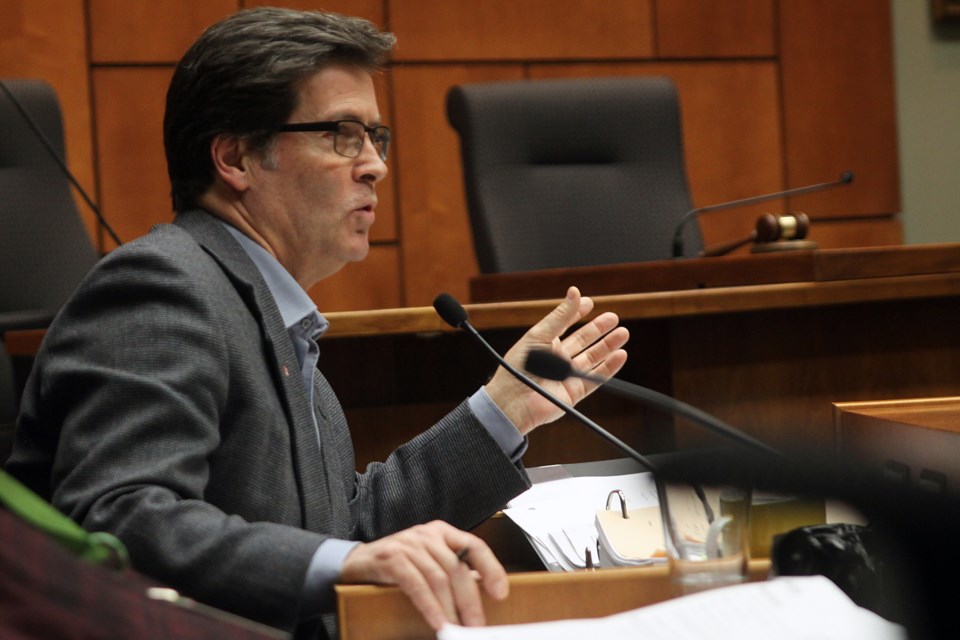THUNDER BAY – A portion of last year’s projected surplus will go towards reducing the 2018 tax levy, despite a push from some councillors to use those dollars to enhance infrastructure spending.
The budget, approved by Thunder Bay city council on Wednesday night, will take $1.125 million to partially offset the levy hike and bring it to an increase of 3.13 per cent – or a net of 2.42 after factoring growth.
The levy increase falls below the 10-year average of 3.36 per cent – or a net of 2.59 per cent after factoring growth. The proposed 2018 budget began with a 3.61 levy rise– or a net of 2.9 per cent after including growth. The tax levy is the total amount of money required to be collected from municipal taxpayers and does not reflect changes to property taxes.
Coun. Frank Pullia, the budget chair, originally proposed shifting half of the projected 2017 positive variance, though the final accounting of the city’s 2017 books has yet to be completed. The money will be taken from the stabilization reserve fund where the surplus dollars would have been deposited.
The allocation of the $1.125 million brings the projected property tax increase for the median household to $87.39, a difference of a little more than $22 compared to where the fiscal framework sat prior to council approving using the funds.
Coun. Trevor Giertuga, who supported redirecting the surplus amount out of reserve funds and towards the tax supported budget, suggested taxpayers should be entitled to a rebate.
“The way I see it is we’re passing the savings back to the taxpayer,” Giertuga said. “This is their money that we took for taxes. It’s like saying Mr. Taxpayer and Mrs. Taxpayer, it’s going to cost us $1,000 to provide this service but it only cost $950 but we’re going to keep that extra $50 and put it in for next year.”
That strategy was opposed by administration.
City treasurer Linda Evans told council that municipalities can’t borrow money for operating losses, making reserve funds a necessary tool to have available in case of emergency. The city ran three consecutive deficits from 2012 to 2014, ending up in the red by a combined $11.7 million.
“Using reserve funds to reduce ongoing operating costs is not a sustainable or appropriate funding source,” Evans said. “Although we’re projecting a surplus in 2017, there remains a risk of future unfavourable variances related to significant weather events, large insurance claims, litigation or WSIB costs related to presumptive claims.”
Coun. Iain Angus, who was one of the backers of an ultimately defeated motion to use $1.4 million of the potential surplus dollars towards capital public infrastructure projects such as roads and parks, sided with administration and insisted many of his colleagues had this fall’s polls in mind.
“I would rather see this budget increase, quite frankly,” Angus said. “I say that in an election year because I want to be honest with the people of Thunder Bay. I know that has negative implications on campaigning but they have to know what it is that I stand for.”
City manager Norm Gale said using one-time funding to reduce the levy this year will likely lead to a higher hit next year, forecasting next year’s starting point levy increase spiking to a net of 5.12 per cent after factoring in expected growth.
Finding as much as $3.7 million to reduce the 2019 budget to levels similar to recent years will be a challenge after $12.4 million was slashed through cost containment over the last seven years, Gale added.
“Our collective efforts to pare the budget, to at the very least constrain growth of the budget, have borne fruit,” Gale said.
“There’s been significant achievement there but that is a finite exercise. Without substantial change to the budget itself, continued paring in that fashion can’t just carry on every year without needing some sort of change.”
Those sentiments were echoed by Coun. Rebecca Johnson, who insisted the city is reaching a tipping point in being able to afford the current services that are provided.
“Nobody is sitting around this table – I haven’t heard it yet (Wednesday night) – talking about where we’re going to cut some things. It’s not just cutting money, it’s cutting services,” Johnson said.
“We can’t continue to keep doing what we’re doing. It’s impossible. The council in the next term of council are going to have to start looking at where we’re going to cut services.”
Additions on Wednesday night included $217,000 towards enhancing staff resources for older adult programs and services such as hiring an additional Lift+ specialized transit operator, $7,500 for Evergreen A United Neighbourhood and $1,300 to have portable washrooms at Hillcrest Park from November through April.
Johnson and Coun. Larry Hebert were the dissenters against the budget.
The budget still needs to be ratified by city council, which is scheduled for next Monday.
